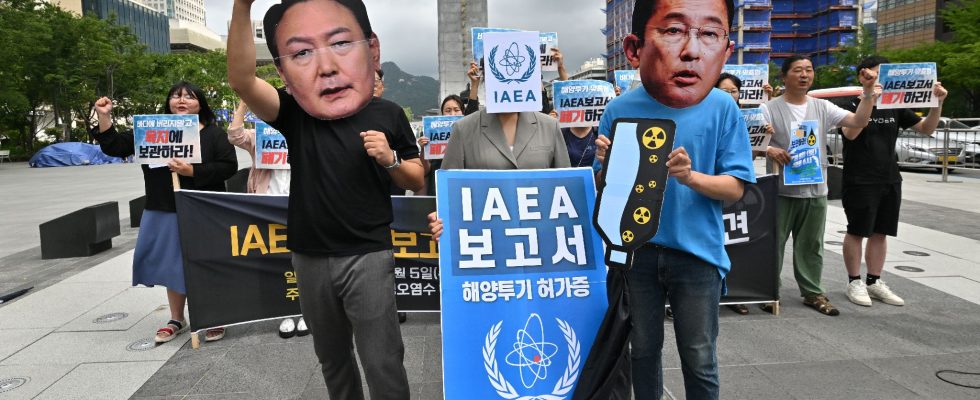Tokyo approves, Seoul and Beijing protest. A controversial project aims to discharge into the ocean treated water from the Fukushima nuclear power plant in Japan, devastated by the triple disaster (earthquake, tsunami, nuclear accident) of March 11, 2011. This accident led to radioactive leaks which caused forced tens of thousands of residents of surrounding areas to urgently evacuate their homes.
Rafael Grossi, the head of the International Atomic Energy Agency (IAEA), met this Saturday, July 8, the head of South Korean diplomacy in Seoul, after a trip to Japan during which his agency approved the project.
What is this project about?
The IAEA approved, Tuesday July 4, this plan of the Japanese government to get rid, after treatment and dilution, of some 1.33 million tons of contaminated water, stored on the soon to be saturated site of the Fukushima plant. The water, treated via a device called “ALPS” to be rid of most of its radioactive substances (radionuclides), but not tritium, must be discharged into the ocean over several decades.
The work to decontaminate and dismantle the plant should still take several decades, but Japan is faced with the immediate problem of storing this water from rain, groundwater or injections needed to cool the cores of nuclear reactors. Tokyo said the release would begin this summer, without giving further details.
What are the risks ?
The International Atomic Energy Agency has estimated that this project “meets international safety standards”, and will have a “negligible impact on the population and the environment”. Rafael Grossi highlighted a “very thorough” approval process within the IAEA. “This is the final full report […]. No expert came to tell me that he or she disagreed with the content,” he said in an interview with the South Korean news agency Yonhap on Saturday.
The measure in any case triggered panic buying of salt over fears that water from Fukushima would pollute the ocean, as well as salt from seawater. South Korea conducted its own study of the Tokyo plan and concluded that Japan will adhere to key international standards, Policy Coordination Minister Bang Moon-kyu said at a press conference on Friday.
The study, which focused on whether the spill would affect South Korean waters, found it would have “negligible consequences”, the minister said.
It would take up to 10 years for treated water discharged from Fukushima into the Pacific Ocean to reach near the Korean peninsula, Bang Moon-kyu said. “It is expected to have a radiation level of around 1/100,000 of the average level in normal times,” he added.
How does the population react?
South Korea has said it “respects” the decision of the nuclear policeman, despite public concern and growing protests in the country. Some 80% of respondents expressed concern in a recent Gallup Korea survey.
On Saturday, demonstrators took over central Seoul to denounce the review, according to them, “insufficient” of the IAEA, while Rafael Grossi met with Foreign Minister Park Jin. They held signs criticizing the agency and accusing it of writing its report “under the influence of Japan”.
Members of the South Korean opposition have also mobilized against this plan, some having even started a hunger strike. Rafael Grossi is expected to meet opposition members in parliament on Sunday. “Japan wants to dump sewage into the sea because it’s the easiest and cheapest way to do it,” Woo Won-shik, an MP, told AFP.
For his part, Tetsu Nozaki, president of the Fukushima Fisheries Cooperative Federation, said the Japanese government was misunderstanding local sentiment, which he said was strongly opposed to the project. “We fishermen have no choice but to react emotionally and harden our attitude,” he told Rafael Grossi.
During a meeting Wednesday in Iwaki, about sixty kilometers from the plant, the head of the IAEA, however, acknowledged that concerns remained. “All these complex graphs and statistics are one thing, but the reality, the reality of the people, the reality of the economy, the reality of the social mood and the perceptions can be different,” admitted Rafael Grossi in front of residents and local officials.
Why is China opposed?
Neighboring countries like China oppose this project. Beijing claimed that the IAEA report “is unable to lend legitimacy to Japan’s ocean dumping plan”. “Japan has unilaterally decided to dump its nuclear waste water into the ocean. It is in fact minimizing its own costs and risks, while leaving the rest of the world to bear the inevitable risk of nuclear contamination,” the spokesman said. Chinese Foreign Ministry, Wang Wenbin in a statement.
“The report clearly states that the IAEA did not recommend Japan to use the sea dumping solution, nor did it approve” this solution, the same source pointed out, calling for an “explanation “from Japan” to the international community.
